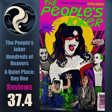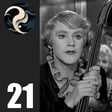Become a Creator today!Start creating today - Share your story with the world!
Start for free
00:00:00
00:00:01

Episode 033 - The Grey Escape
In this episode we discuss the cinema of the grey and how movies represent old age for good and bad in a wider cultural context
Intro clip from Robert Zemeckis' "Death Becomes Her" from Universal Pictures
Opening music: https://pixabay.com/music/id-116199/
Closing music: https://pixabay.com/music/id-11176/
Two Oceans is a creation of Siouxfire & Scrumpy in association with SiouxWIRE
Recommended
Transcript
Reflections on Aging
00:00:10
Speaker
I'm getting too old for this sort of thing. Two oceans will begin. So... So full of light.
00:00:30
Speaker
and are readied eps away from you. This is life's ultimate cruelty. It offers us the taste of youth and vitality, and then makes us witness our own decay. Well, it is the natural law. No, screw the natural law!
Introducing Tuitions Podcast
00:00:55
Speaker
Welcome to the tuitions podcast. For myself, Sue Fire, along with my friend and seasoned colleague, Scrumpy, discuss film and other media through a decades long lens of mass media consumption. In this episode, we look at the cinema of the grave featuring good and bad representations of old age in a wider cultural context. This is the tuitions podcast. So get on your riding lawnmower and head out to the interstate as we begin episode nine, series two.
00:01:28
Speaker
Yeah, we're building a foundation here. Right? So, on to the gray escape. And as with most of our episodes, they grow a lot. I can't hear you. I'm doing research. Huh? Get your horn out. Exactly. Turn up your hearing aid. My hearing horn. Look it up, kids. Yeah, look it up, kids. Yeah, watch some old movies.
00:01:52
Speaker
So we're going to take a look at the historical context of old age representation in film, as well as positive, negative, and complex representations. Changing perspectives and why it's important.
Demographic Shifts by 2050
00:02:05
Speaker
I think straight off the bat, one of the big ones is the demographic changes that we have. So the United Nations says the number of people aged 65 years or older worldwide
00:02:18
Speaker
is projected to more than double, going from 761 million in 2021 to 1.6 billion in 2050. And number of people aged over 80 is growing even faster
Media's Negative Representation Trends
00:02:30
Speaker
than that. So, hey, movie makers, we got the money.
00:02:36
Speaker
population is aging. And I expect that will change, but kind of similar to the other minority groups that we looked at, you know, in terms of the queer episode and the Native American episode and the black episode as well, is that the first representations always end up not being great. It's the representations.
00:02:56
Speaker
Right. I mean, it's a whole thing. You don't want to you want to stay young in the pictures, right? It's the the core of Sunset Boulevard. You know, it's the well, speaking of if you've seen the variety photos, Robert Downey Jr. and Jody Foster this week. Yes, they're ridiculous. They look like they're 22. They don't look like that.
00:03:15
Speaker
No, no. It's, yeah. So you're trying to take over the Hollywood-est of it versus the cinematic, right? Right, right. And it's, I mean, the other thing that we're not going to be able to kind of cover is kind of gender split as well, because that's a whole other topic on its own. And I think we're going to have to, once we get into the episodes about women, this is,
Old Age in Early Cinema
00:03:41
Speaker
that's definitely going to be central to the topic.
00:03:43
Speaker
Yes. But yeah, I mean, for men, basically, it's okay looking old, as long as you act young. Well, for men, it's okay, you could just stop there. Unfortunately, but that's the reality of it. Yeah. I mean, the whole thing with sort of a backlash to women appearing in roles is this whole thing that's going on with Furiosa at the moment, which is
00:04:07
Speaker
Which is silly, and it's happening with Star Wars as well, but like I said, that's something we're going to have to pick up in another episode. Right, part one, the historical context. So in early cinema, almost all the actors were entirely young. It was all youth orientated from the very start.
00:04:27
Speaker
with old age being represented as a tragedy, especially for women. And typically older people were supporting roles, supporting. Yeah. They're there just to, yeah. Yeah. Light relief, you know, that sort of thing. I mean, in similar to what we've seen or drive the conflict, you know, be like, Oh, this here's a stern old father that won't let his daughter marry the brash upstart or whatever.
00:04:52
Speaker
Yeah, yeah. And then older women are either super maternal or they're monsters, you know? Yes. And this echoes, like I said, everything that we had in other the minority episodes that we've done. Right. Is they they're all sidelined. You know, cinema is very consistent in its exploitation and poor representation, isn't it?
00:05:14
Speaker
It's grim, isn't it, really? Not a white guy, look out.
Slow Progress in Age Representation
00:05:17
Speaker
Yeah, a young white guy. Young white guy, I should say, yeah. But at the very least, the age thing, it's got to come to all of us, you fuckers. Exactly. But, I mean, the progress has been really slow. The representation has improved. But, you know, again, the representation always starts off really poorly and still predominantly white characters, at least for, you know, Western movies, right? Sure.
00:05:44
Speaker
Right. So that's a little bit of a historic context. A lot of it hasn't really changed too much, to be honest. The first part we'll look at is on the positive side, which is positive representations.
Positive Depictions like 'The Straight Story'
00:05:56
Speaker
Empowering narratives that depict older adults as strong, capable, and resilient. A to B old.
00:06:01
Speaker
it's okay to be old. And the first one that we got on our list is David Lynch's 1999 The Straight Story with Richard Farnsworth. Yeah, that one just, yeah, and that one hits so well. I mean, again, it kind of points to the timelessness of the story. It's just using the age thing is all tied into all the metaphors of everything else going on, right? And trying to seek reconciliation. And that's a lot of, you know, a lot of the things that haunt
00:06:30
Speaker
people in their golden years or such too, you know, either, you know, making up for things that were done poorly in youth or, you know, so reconciliation, forgiveness, regret, rather than just, oh, I'm not young anymore. And you know, I drink a can of Pepsi and I'll be fine and I can act like a young person. It's like, no, it's okay to act like an old person, you know, because there's more important things to do than just being run around and partying and,
00:06:56
Speaker
That sort of thing, which can still happen. You know, there's still that, you know, when they show old romance or something like that. But yeah, and the straight story gets right to that, you know, just with the thing. I think it's one of the best examples as well. Totally, totally. Like David Lynch just nailed it. I think the only part of the film that really feels like David Lynch is there's a very creepy bit at the very beginning that kind of zooms into this window with like a teapot sort of starting to boil. Yeah.
00:07:21
Speaker
But the other interesting thing about this one, kind of tragic actually, is Richard Farnsworth had cancer while he was filming this. And after the film had finished, he had committed suicide, which is, yeah, it was kind of a tough one. It gives it sort of another dimension in the straight story. And there's also the highway
00:07:45
Speaker
if you think of it as a metaphor, is how society treats older people, because he's not driving on the road. He's off to the verge, right? He's on the side of the road. Literally on the margins. Literally on the margins. And, you know, as the big trucks, which you could kind of take as being the youngins, kind of blow past, you know, they blow off his hat and all this, they kick up a bunch of dust.
00:08:10
Speaker
but he keeps kind of moving ahead. I think the other thing about this movie as well is that all the people that he comes across are really well-meaning, but kind of think they offer him help, you know, will drive you, right? And he's like, no, no, no, no, I've decided how I want to do this. And they think he's too proud to accept it, but he really just doesn't want to accept it, you know? Yeah. That's another theme that comes up a lot with these is there's a certain committedness. Yeah.
00:08:38
Speaker
that once you give yourself over to it, you know, you're accepting, you're accepting your end as a reality. And therefore you commit in a way that nothing will shake you. And you know, it's like, Oh, it's just a quirky old man. We write a younger folks write it off as, you know, quirky old man, or just like, Oh, they're crazy, or Oh, that that's just the way they are. So we, you know, we allow it. But but you know, the it's just a matter of how hard
00:09:03
Speaker
you lean into that. I think that's a theme of a lot of these movies that have a lead protagonist that's of age. That's what they're trying to use to convey the entire story, right? Is this something that people can identify with of any age to respond to?
00:09:24
Speaker
I mean, it's the other thing with older people is all these tropes that we talked about from the early cinema. They've ingrained themselves now. And, you know, someone young acts weird. The people come out, you know, he must be drunk or something. Someone old acts weird.
Films on Legacy and Mortality
00:09:40
Speaker
He must be senile, right? Yeah. Or, you know, he's starting to lose it.
00:09:44
Speaker
Right. On to the next one. We've got The Man Who Killed Hitler and Then the Bigfoot, which is a great title. Great title. Have you seen this one? I have not yet. I have yet to watch this one. It's in the queue, has been, though, for too long. It's a good one. It's an interesting one. It's played so straight as opposed to that title. And there is a quote from Sam Elliott, which where he's kind of reminiscing about his life and he's like, it's nothing like the comic books you want it to be.
00:10:13
Speaker
Right. And the focus of this movie is totally on Sam Elliott's character in his youth killed Hitler. And now he he's being recruited to get rid of the Bigfoot as well. But most of the film is about him thinking about what he's leaving behind. Has it been worth anything? So so it's not an alternative timeline. He's killed Hitler in our timeline. It's just been kind of hushed up.
00:10:40
Speaker
But all Hitler's ideas carried on, you know, living after him. And he's kind of questioning, you know, was it was it worth it, you know, and again, it's another thing that pops up, again, across a lot of these films, the ones I've seen, anyway, is a term, you know, thoughts of legacy, right? And what, what you leave behind and what, what kind of note you end the conversation on, you know, how do you punctuate your life? Exactly.
00:11:05
Speaker
The only thing I'll say about this movie from a review standpoint is the music is really intrusive. It's like John Williams at his worst. It is really kind of pushing you. It's okay. It's not too bad, but there are just moments in the film where you're like, this would be a lot better if it were just silent. I think it would have.
00:11:26
Speaker
impacted a lot more. But yeah, like you said, he's reflecting on his mortality, reflecting on what it means to have your life defined by killing people. And did it really achieve anything? And the effects, by the way, in this film were from Douglas Trumbull, who did the effects on 2001. Malick's Tree of Life, Silent Running, Blade Runner, and interestingly, his dad worked on the special effects for Wizard of Oz as well. So there's a kind of long heritage going on there.
00:11:56
Speaker
But anyhow, on to the next one, Unforgiven 1992 from Clint Eastwood. Yes, disassociating Clint Eastwood from everything else he's tied into politically and such. Yeah, this one's just, and this was like, there's been a lot of, you know, there's been a lot of Westerns, especially that talked about old men.
00:12:16
Speaker
kind of coming back or getting pulled back in or having the answer for the life they had as a younger man sort of thing. I mean, that, or, you know, that's right the high country, you know, the first, Peckinpah's first movie. That's, that's all about that. You know, he says, you know, Randolph Scott's the, he's like, I just want to enter my house justified. And that's how he wants to end his, you know, entering the house is how I leave this world is that I did something. I was okay. I did something. Okay. You know, I didn't leave the world worse.
00:12:45
Speaker
by being in it. And, you know, it's just that same idea and that's what's here, you know, especially with Eastwood's character that's already been redeemed, sort of. And then he has to go through this other redemption with the, like you said, with those ideas that are still lingering on and what survives and what doesn't, what he has to revert to, you know, as a base, as far as his identity and what that means for everything else. Yeah.
00:13:10
Speaker
Well, you have a bit of a feeling that he has kept his past to himself. It's it's a bit of a secret. Yeah. And then by the time that he lets it out, that, you know, he is a cold blooded killer of women and children, that it's almost like a flood, like it's been held back for a really long time. And there's a point where it kind of breaks through and this whole kind of redemption thing, I think is another
00:13:36
Speaker
Another one that that is understandable for for any age, because this is a movie I got when I watched this in 92. Right. And it made sense to me then. Whereas there are some other movies that didn't make sense until more recently. I think. Right. Yeah. One in particular is Von Trier's Melancholia.
00:14:02
Speaker
It didn't really click with me, right? I loved the visuals, loved everything about it, but then until I started doing research on this episode, I realized that it was about death. It was about mortality, right? This rogue planet headed toward Earth. It's inevitable. You're going to die, right? And it's not a science fiction thing. It's kind of a metaphor for, you know, our mortality. You know, you got to face up to it.
00:14:28
Speaker
Yeah. But,
Unconventional Aging in 'Harold and Maude'
00:14:30
Speaker
yeah. Well, that's the same for me with, you know, as a younger man, you know, I would have said my favorite Kurosawa film was either Seven Samurai or Rashomon. Sure. Even Ron, which we'll probably talk about here in a bit. But as I've gotten older and started looking at Ikiru,
00:14:47
Speaker
is by far and away my favorite. Like, and it wasn't as a kid. I was like, Oh, okay. You know, I get it. Okay. That was, it looked neat. And, but it was kind of long. And now it's just like, now I, you know, I can't watch it with, think about it without crying. You know, it's kind of, it really hits. It really just like, you know, and again,
00:15:05
Speaker
Of course, I wasn't old when he directed that and just where it falls in the whole pantheon of his work and what it's saying and the performance. For me, it resonates so much more and I think that's what a lot of these are maybe meant to do, necessarily what you're getting from a filmmaker.
00:15:27
Speaker
Regardless of where they're at, you know, George Miller 78 and just did Furiosa, you know, it's not like he's doing a movie about aging or dying necessarily, you know, I mean, I think that's a big thing that I and it's probably going to be our kind of mission statement going forward for like two oceans, you know, is is trying to get people to kind of realize that we're all works in progress, right?
00:15:50
Speaker
And whenever we die, we're going to have unfinished business. Everyone does, right? That's just the way things work. But the way that people close themselves off, I think we talked about it a bit last week with some of the weird episodes.
00:16:07
Speaker
and kind of just go in circles in the same movies. They'll watch the same ones again and again, and they want to watch movies that are exactly like those movies and blah, blah, blah, and they never kind of go outside their comfort zone. So I'm hoping going forward that we can try to encourage people to try something different, add something to their movie diet. Next up, we've got Harold and Maude from Hal Ashby, 1972.
00:16:30
Speaker
Now, I posted something on Hal Ashby today, and there was a fairly negative comment about Harold and Maude, where someone was ranting. Which I saw, disgusting characters. And it was like, well, and I pointed out to him is, well, you know, I don't agree that they're disgusting characters in this. One, it's comedy. Two, there are movies that have a lot of positives, have nothing but disgusting characters in them. You know, Clockwork Orange.
00:16:58
Speaker
you know, a lot, a lot of recent movies as well or succession or something like that or something, you know, exactly, exactly. But it's always sunny. I mean, how how Ashby was bold in this because I rewatch this one in the last week and I forgot how absolutely bold it is. And I don't think there has been a character, especially a female older character,
00:17:23
Speaker
done so well as mod in this. Oh, yeah. Yeah, absolutely. It took me a long time to watch it. It took me a long time to watch it, too. And I don't think I would have, if I'd watched it when I was younger, I would have appreciated it. No, I don't think I would have either. Versus, and it's not played as a sweet like, oh, isn't that cute sort of thing? It's like, no, here's an honest connection, but let's make it honest. You know, and that's pretty much all of Hal Ashby's stuff anyway, right?
00:17:50
Speaker
But, yeah, but Harold Mudd in particular, yeah, because he feels out of time as a young man, and she feels like a young woman, also out of time, you know, that's what clicks with them, is not that they're like meetings, what they're meeting over is they're discontentedness. And it is very darkly funny. And it is very dark, yes, and very funny.
00:18:14
Speaker
I would say that anyone who likes Wes Anderson will be kind of blown away that this existed in 1972 because Wes Anderson has borrowed quite a lot from Hal Ashby. He's inspired by, yes. Yeah. And little side note here, Tom Skerritt plays the motorcycle officer that stops them in the movie.
00:18:37
Speaker
Oh, that's right. It's like one of his earliest roles. Mm hmm. That's funny. Right. Speaking of somebody who always seemed to be old. Yeah, those actors I always thought was old, you know, always. Well, it's funny, isn't it? Even in Alien or when he was on Cheers or something like that. He all just seemed old.
00:18:53
Speaker
Yeah, actually, everyone that was an alien pretty much aside from Sigourney Weaver, they all were those types. And next up, it's not really an old person's one, but No Country for Old Men, I think is just worth a quick mention just because it ends with that great monologue. Well, and it's also the thematically, it's about aging out and what's left behind and what replaces it or what comes in and how you deal with that.
00:19:23
Speaker
There's that weird nostalgia and the wish to carry on versus when it bumps up against some reality that it just can't... It's not meant to understand. It can't understand. It's not a peaceful transition of power. I think there's that expectation at that point in life that the surprises are fewer and fewer. Exactly. And I think the Tommy Lee Jones character,
00:19:49
Speaker
just doesn't even know how to process that. Anyone like does exist. Yeah. Cool. And I can go off how that's a metaphor for eighties America with Reagan coming into office, but I'll save that for another time. What this technically fits into our crime episode as well. Oh yes. Oh yes. Touch on it there. There are a lot of movies that, that, that have that sort of framework of, you know, keep the money, get corrupted by the money.
00:20:18
Speaker
And the next one on the list, we've got the Gray Fox from 1982. More Richard Farnsworth. Yes, more Richard Farnsworth. And I have not seen this one in a very, very long time. Same. Yeah. I probably saw it in 1982.
00:20:35
Speaker
Yeah, me too. And it was one of those ones that Cisco and Ebert were kind of going on about, going like, this is exceptional. But yeah, I remember really enjoying it. I'm going to have to revisit it because I think it's probably going to benefit from watching it now, like the others. But another one that's more recent is David Lowery's The Old Man and the Gun from 2018 with Robert Redford, Denny Glover, Tom Waits.
00:21:01
Speaker
Yeah, this one just flew under the radar when you saw it on the list. I was like, oh yeah, I didn't watch that movie and I'd forgotten it was David Lowry, so I'll definitely go back and watch it. Oh, definitely worth watching this one. Yeah, right? Everything the guy does is solid. That whole cast as well, it does have to do with age and looking back at your youth because Robert Redford, similar to William Money is, you know, except he never reformed.
00:21:26
Speaker
You know, he's decided, you know what? That was the best days of my life. I don't regret it. I'm going to continue doing it. Right. Baba Hotepp, 2002. Don Casarelli, who also did the Phantasm series and Beastmaster. And Beastmaster. Yeah, and Beastmaster. And Beastmaster. Bruce Campbell and Aussie Davis. And yeah, this one's just
00:21:53
Speaker
Yeah, the original story was great. I was a fan of it. And then when they made it into a movie, I just loved it even more, especially. And the casting. The casting is spot on because it's Elvis in a East Texas retirement home that he didn't die. He just traded.
00:22:08
Speaker
traded off the life, let somebody let a nervous impersonator take over for him. And so he's just living out his days, wondering about his existence, especially, you know, full of regret and longing, right? It's that like, I used to be this Vero guy and then get this shot in the arm as Ozzy Davis, who swears he's JFK. And there's a strong case to be made that he actually is in the movie. And the two of them realize that there is a mummy tormenting and sucking, eating the souls.
00:22:37
Speaker
The souls that can't put up a fight and resistance and a mummy that crashed basically nearby and has found this feeding ground.
00:22:48
Speaker
of people that can't really fight back, and so they decide to fight back, but in the way that only old people can. It's very much like the, which is one of my favorite fight scenes of all time, is the ending fight scene from Up. Right. Because they're fighting like old men, but they're still fighting, but they're trying to do anything, and this is like, oh, okay, that's not gonna work. They both have to stop because they've thrown out their back.
00:23:15
Speaker
Yeah, that's to like, give me a second, give me, okay, give me a minute and then back at it, you know? Yeah, it's a great and it reaches a peaceful thing that's kind of like, hey, one last, one last hurrah, which is another, you know, thematically comes up that people can kind of
00:23:30
Speaker
seem to resonate well with. It's like, you know, it's like, why not? Why not one last shot, one last attempt? I mean, the funny thing is it does play into some of the tropes for old age, but puts a twist on them, right? Yeah. It actually turns them into advantages.
00:23:53
Speaker
Exactly. Which is pretty terrific, why it's in this part of the list. The next one, the last one for the positive so that by no means this is not exhaustive. Not exhaustive, yeah. Henry from 2021, from Patsy Panacaroli, who did the Jay and Silent Bob reboot. Yeah, but I guess you got to start somewhere. Nelson is awesome in this. Great. Yeah, this is the
00:24:19
Speaker
Yeah, the hidden identity thing, without spoiling it, the hidden identity thing, the past coming through, and what you do for the future, what you make up for for your past and what you may have the... And again, another theme that comes up is that there's a possibility for some way to save the future, save the next generation. They could save someone younger, someone younger is involved and they're in trouble and this person can come in and
00:24:47
Speaker
Maybe he has to throw away everything they've built or tried to get away from. Another one like this is The Hard Eight. Anderson's great movie in the Philip Baker Hall's character. He has to go back to what he thinks he's not anymore, but in order to save what should be saved kind of thing. Old Henry's like that. Tim like Nelson's fantastic in this as well.
00:25:11
Speaker
That's another thing I kind of forgot about the Unforgiven as well, is that you have William Money giving the advice to the kind of younger guy in terms of how he should live his life. And he by no means says you should live it like mine.
00:25:29
Speaker
Well, and it has that they're able to come to these other levels of understanding. You know, and I'm forgiven has one of my favorite lines ever in cinemas when he takes down Gene Hackman's corrupt sheriff character and well, corrupt, I don't know if this is the right word, but evil character. And he says, like, he says to him before he kills him. He's like, I don't deserve this. And he tells him deserve has nothing to do with it. And, you know, there's just a point about life, you know, where he's at and how he's processed life. If it was deserving,
00:25:59
Speaker
then it would be reversed. If it was justice, if it was dessert, it was about writing wrongs, about putting things back in balance. It's like what you can do, what note you send it off on, and you've made your choices kind of thing.
00:26:12
Speaker
Yeah. And I'd also point out there were a lot of Clint Eastwood films, which you could kind of classify as being about older people, but there's a reason that Unforgiven is on this list. Yeah, it is. Yeah, right. Right. So moving on to part three around the negative representations. And by the way, these aren't necessarily bad movies. No, exactly. Just Cause is a great film, but does nothing for furthering people's understanding of sharks. So these could be good. I still hate sharks because of it.
00:26:40
Speaker
Yeah. I know I shouldn't, but I do. And as a little plug, apparently the new Netflix film about the shark in Paris is meant to be a heap of fun and really well made. Very nice. I'm going to have to check that out. But yeah, these films can be good while also poorly representing the elderly for sure. And some of these are just god awful. In fact, probably is one on the list that is the worst movie I've ever seen.
00:27:03
Speaker
Well, do them grouped into stereotypes and tropes. The first one being our eccentric or comic relief. And the first we have on this list is Donald Petrie's Grumpy Old Men from 1993, which also had a sequel. And a sequel. He earned a sequel. Oh, boy. Yeah.
00:27:24
Speaker
What is there to say about this? I mean, yeah. It's like they regurgitated all the jokes from old older movies about the old and stereotypes. Yeah. And just threw them all in this one. And and hey, we can still be old and filthy and filthy minded and that sort of idea, because basically, you know, I mean, the premise of it is because they're horny.
00:27:52
Speaker
And they're fighting over the attentions of the same woman. Yeah. And two old friends that suddenly become enemies sort of. Yeah. Warring neighbors, which is, yeah. Yeah. Yeah. Yeah. We don't need it. It's problematic at best.
00:28:09
Speaker
It was that particular era of movies, and I remember this being rented all the time because I was working in a video shop at the time. Sorry, it's out. Lucky you. The next one on the list is Waking Ned Divine from 1998 from Kirk Jones, who Kirk Jones also created that ilk of movie as Grumpy Old Men.
00:28:33
Speaker
I kind of enjoy Waking Dead Divine on a certain level, but it is aged poorly for sure. Yeah, that's the thing. I haven't gone back and I'm not really interested to. Yeah, no, it's very, very formulaic. And all these sort of elderly people are kind of playing their parts, you know? Mm-hmm. And women are completely sidelined in this. Oh, yeah. And in fact, I think in most of these movies, they are. Yeah, but say it, that's another common thing, yeah.
00:28:59
Speaker
Yeah, unless it's one about women or, you know, where they're very much in the forefront. Yeah, they're pretty much. And the next one is exemplary. And in fact, this is, this is the ones movies ever is Dan Mazur's Dirty Grandpa from 2016.
00:29:19
Speaker
Oh my God. I've got Robert De Niro, Aubrey Plaza, Zac Efron, Dan Mazur did the Borat movies, but he also, the only other film he did since Dirty Grandpa was Home Sweet Home Alone, which was poorly received. Could be a career under Dirty Grandpa.
00:29:39
Speaker
I mean, I think the problem that I have with it is that it does that same thing that you were mentioning about, oh, he's old, but, you know, he's still horny and he can be dirty. But then it kind of veers off into sentimentality as well. So it's like it couldn't even decide what it wanted to do. You know, it's yeah. Yeah. Less said about that. Yeah. It's Robert De Niro as well. So you feel even that much more like he hasn't acted in a movie in 30 years. So yeah.
00:30:09
Speaker
Well, you got Robert De Niro in your movie. Treat him with a little bit more respect than that, buddy. He would think so. There you go. There's a paycheck. Go nuts. Next category we got is the category where the older character is one to be pitied. The first one that we have on the list, and it's not the first one from Alexander Payne, is about Schmidt from 2002, which is a weird movie. I think the bit I enjoyed the most was a very opening.
00:30:38
Speaker
where he's waiting for the clock to hit five o'clock on the last day before his retirement. And he's not leaving a second earlier. But the film again, the women are completely sidelined in it. There is the letter that he's writing to the kind of orphan that he's sponsoring in Africa for like 22 bucks a month. And
00:31:02
Speaker
I don't know. It's a weird one. And Alexander Payne is going through a lot of controversy at the moment as there's all these things about his last movie being plagiarized. Plagiarized, yeah. But yeah, about Schmidt is funny. I mean, it's a great performance from Nicholson, for sure, because he's not playing his usual part. He's actually playing someone who's older and behaving typically as an older person would.
00:31:31
Speaker
But another example of this one to be pitied is a man called Ove, which was remade with Tom Hanks. That's the one a man called Otto. Yeah, a man called Otto. No need to remake it. I don't understand why they did. But again, it's one of these things where
00:31:53
Speaker
It is playing on the pity that you have for this person. You don't like them at first and then you get to know them and then you feel really sorry for them, credits roll kind of thing. But yeah, it's an okay movie. Like I said, some of these are good, some of them are not. And I think about Schmidt is all right as well.
00:32:13
Speaker
The next one, and I've not seen this since the 90s, and I didn't like it back then either, is driving this daisy. This has a lot of problems with it. Not just in terms of how it treats the elderly, but the kind of racial element in it as well. Oh, yeah. Awkward. Oh, there are people too, and it's kind of like, yeah, okay. You can only realize when you're old.
00:32:38
Speaker
either when you're old and you realize your white privilege status and on the other side, it's like, well, you've endured long enough as a black person. So now you can see it through and get a reward that a white person changed their mind.
00:32:54
Speaker
about black people or whatever. The only thing I like came out of the whole movie itself. You've got good performances. It's Jessica Tandy and Morgan Freeman who are great.
00:33:10
Speaker
in it for what it is. No, no, their performances are good. In fact, didn't she win an Oscar as well? I believe she did, yeah. But it's the line that Samuel Jackson uses in Long Kiss Goodnight when he's like, he's like driving the car, he's like, yes, Mr. Misdazy, I'd be driving, you know, just throwing it out as a joke during the middle of action, you know, it's like,
00:33:32
Speaker
It's like, oh, yes, sir, you know, just like playing up the basically is like, okay, now he's speaking for the black community's response to this movie. So yeah, yeah. And yeah, but the fact that she's old kind of gives her the like, well, and it's a weird thing, you know, with racism, you know, we talk about, you know, like, oh, with, you know, grandma didn't call them Brazil nuts or something like that. You know, it's like something we,
00:33:56
Speaker
You kind of hush away or push away, push to them more intentionally because you're hoping some of these tropes that they embody too will die out with them. They're not going to change. The fact that someone does is like, oh, isn't that remarkable? Isn't that noteworthy or inspiring? It's like, well, sure, but no, because it doesn't happen.
00:34:19
Speaker
our generation as well is getting to that age and that attitude of, you know, they were too old to change. They're starting to do the same thing with themselves, which is crazy. The next category we've got is the burden. And this is where the older person is kind of seen as
00:34:42
Speaker
something to be dealt with in his responsibility and a weight. And you've got- We've got to deal with dad and it's usually dad. Sometimes it's mom, but it's usually dad. Yeah, true. Yeah, that's true as well. You've got, well, in Nebraska, that's not going to extend your pain. Yeah, the mom's not the problem. No. It's just dad.
00:35:03
Speaker
I mean, I enjoy the tone of that movie. I think the performances are really good. And also at the same time, it kind of perpetuates that, you know, dependency of older people. So if you go back to like the 1970s with another kind of movie with older people, he had on Golden Pond and that kind of really kind of hammered home that, you know, don't you couples break up, you stay together.
00:35:28
Speaker
No matter what, because otherwise you're going to be alone. And the other movie that we have in this category is Tamara Jenkins, The Savages from 2007. And it's been a while since I've seen this, but it's the same idea. It kind of kicks off with
00:35:46
Speaker
having to handle an illness with dad and the whole thing with family having to deal with preparing for death. And again, it's the whole burden thing. You're like, you take care of dad. No, I'll take care of dad. No, no, no, no. It's one of those things you don't even think about. I didn't really think about, to be fair, until I started doing research for this. And it was like,
00:36:10
Speaker
God, this is really bad because a lot of these tropes are just so consistent. And then the last category, I'm not going to go over this too much because I think a lot of movies go into this and this is the forgotten where the older person is kind of just forgotten by everyone. But that's true of even some of the kind of positives that we have on our list as well. Also true, yep. Yeah.
00:36:34
Speaker
Right. But just as a couple of examples, The Wales of August in 1987 with Bette Davis and Lillian Gish. I'm Not Rappaport from 1996. Another good example, but like I said, a lot of the stuff, you know, Ikiru is a great movie. But again, it's got the thing of, you know, kind of being forgotten and sidelined. Although, and again, I think it goes into our next section a bit more of the why.
00:37:02
Speaker
Yeah. You just, you've got gray hair. Well, I don't see you. You're invisible now. Yeah. Yeah. Right. Or the, uh, Oh, who was it? That was the Amy Schumer bit. The, the, let's get about the, the women, the actresses, once you hit 40 and you're not fuckable anymore, what happens to you? And they're all forgotten as if they're all forgotten or something like that. Yeah.
00:37:22
Speaker
They're all like, oh yeah, now that we're not young anymore, we're put out to pasture. We're completely forgotten. It's very true with women as well, unless all of a sudden, it was the thing with Sally Field. She went from the love interest in one movie in one year, and the following year after she turned 40, she was somebody's mom.
00:37:44
Speaker
of the same age of the guys you've just been dating in the previous movie, something like that. It's the dustbin of, oh, I guess we could still do something with these people.
00:37:56
Speaker
I mean, this is the thing. It's you think of that way you're just talking about there. Who was it that played Aunt May in the new Spider-Man movies? Yeah, Marisa Tomei. Right, right. Which is crazy, crazy to think that, you know, she'd gone from something like Before the Devil Knows You're Dead to that, you know, to being Aunt Freakin' May, right? I'm coming from a comic book perspective. Right.
00:38:26
Speaker
But anyhow, seeking into part four, these are the more complex representations that were the nuanced characters that present older characters with some depth. And the first one that we have in the list is Akira Kurosawa's Ikiru. Yeah.
00:38:39
Speaker
And I think, yeah, what you're saying about, because he is forgotten, but he's, because he's forgotten himself or really never really known himself. Yeah. It's going to go when you've put your own life just to the side before. Yeah. Or just living. Well, yeah. Putting living aside just because it's too messy. It's too painful. It's too complex. So rather than dealing with those things that really remind you that you're alive, you just stow them away and become a bureaucrat and
00:39:07
Speaker
give yourself over to that mentality and only at the end realizing, you know, when he's freaking out and they think he's dating the young girl, but he's just like, there was an employee in his office and he's like, no, he just, I don't want to know how do you live? How do you have that energy? What, you know, it's just, uh, yeah. Well, broaden horizons, which is the whole thing that we've always been talking about, you know, and kind of understanding it, opening doors, looking at things that you haven't, haven't gotten seen before.
00:39:37
Speaker
The next one we have on our list, I don't know if you've seen this one. Man, Make Way for Tomorrow, 1937 from Leo McCarry. Have you seen it? I have not. No, I'm not familiar with this one. Brace yourself. This is a potent one. Basically, this one was inspiration for Ozu and Koko Noda's Tokyo story.
00:40:00
Speaker
Okay, I'm familiar with that one. So Orson Welles listed it among his favorite movies of all time. It is unflinching, right? The studios when they got the first cut were like, no, you can't do this. But somehow they managed to kind of push it through.
00:40:20
Speaker
So, so basically you have this old couple, you know, during the depression, they're obviously having difficulty. They've got adult kids, but the adult kids are kind of playing hot potato with them, don't really want to have anything to do with them. They've got their own problems to deal with.
00:40:37
Speaker
And the kind of bureaucracy and the kind of changing attitude toward older people is just stark in this movie. And it has as a harsh end. I mean, it's not a happy movie.
00:40:53
Speaker
Right. You know, we talked about those movies that you might watch once and maybe not watch it again. This is one of those movies. And and it's kind of the amazing thing that this is 1937 and there's still movies from that time. You know, we talked about freaks before that that are still to this day kind of retain their shock value and their power. But Make Way for Tomorrow is one of those. And the whole movie is about
00:41:21
Speaker
how, quotes, modern society treats older people. And this was 1937. And I'm sure that we haven't improved. Yeah, right. So it's pretty tough. The next one on the list, Plan 75, I've only just watched this today, is a Japanese kind of dystopia type movie, 2022. If you think of
00:41:45
Speaker
Midsommar or Logan's Run where older people have to die at a certain age. And you kind of mix that up with sort of Battle Royale. It's entirely done as a straight kind of drama. It just basically opens up with a kind of massacred and old folks home. You don't really see much. You see hints of what happened. But the government puts in this Plan 75
00:42:11
Speaker
where people for free at 75 can be euthanized, right? Voluntarily. And what they do is people, you know, this plan 75 is being advertised everywhere. I'm talking about the kind of, you know, you don't want to be a burden on the younger generation.
00:42:30
Speaker
hey, why don't you do this and you'll get a thousand bucks worth of yen and you'll get counseling ahead of it and then you will be euthanized at the end of a period of time and you're allowed to change your mind and all this other stuff. But it's interesting because the focus
00:42:49
Speaker
on the elderly characters in this is really good. You know, they're like three dimensional characters. But the way that the people who are kind of working for this government agency for Plan 75 are so head down and doing their job is kind of chilling. But even those characters kind of develop over the course of the movie as well. It's an interesting one. It's definitely an interesting one. But it just takes it on so head on.
00:43:17
Speaker
with the way that it approaches it, you cannot stop it halfway because the first half, it just in earnest kind of has these ads and stuff and information about Plan 75, where they're like, you know, Japan has this heritage of self-sacrifice for the greater good, and this is part of it. You know, you don't want to be a burden on the younger generation. It's done really, really convincingly, but
00:43:46
Speaker
Next to Make Way for Tomorrow, this was a walk in the park, like this was a joy. But yeah, Make Way for Tomorrow is one of those movies that will scar you, it'll leave a mark, right? Next on the list, we've got actually Harry Dean Stanton's last movie from John Carroll Lynch, Lucky in 2017. It's also got David Lynch in it. It's got a Jeremyish tone, like Stranger Than Paradise, and Harry Dean Stanton is playing a 90-year-old
00:44:16
Speaker
and he smokes pot, he meets up with his friends. He's thinking about his legacy as well in the movie, kind of pontificating, but kind of in the same way that anyone at any age would. So it's a really good performance from Harry Dean Stanton. I don't think he has any other kind of performance. But the way that they treat his character is really well done in this, and it's quite interesting.
00:44:42
Speaker
Yeah, right. Snick Dokey, New York. Never know how to pronounce this. Sinek Dadosh or whatever. Philip Kaufman movie. Charlie Kaufman. Charlie Kaufman. Yeah, actually. I'm gonna have to watch this one again, because as I watched this, about the time it came out, and it didn't click with me at that point, I think it might do better now. Have you seen it?
00:45:10
Speaker
I think I watched it. I think I kind of wrote it off. When I did this kind of like, okay, he's just out of control now. I had the same feeling. I thought tonally it didn't kind of hang together very well. Right. And it lost me part of the way through. I mean, the one thing that I
00:45:29
Speaker
did like is they had Emily Watson in it and Samantha Morton and everyone got confused about them because they thought you're the sort of young British person like actress and they just look kind of similar and they just kept getting confused which I thought was quite funny because I knew people confuse them in other movies.
00:45:50
Speaker
Right, on to the next one, Ambruto D. from Vittorio De Sica in 1952. This is a great one, and this is one that I hadn't watched until the past couple of weeks in preparation for this episode. It's darker than I thought it would be, while also it's got a more similar tone to the bicycle vibes.
00:46:11
Speaker
but a little bit lighter. And it's in Berto D who is so they, the pensions that people have are not enough to kind of cover their expenses. So a lot of the elderly people, unless they add savings, which in Berto D does not have a real hard time. And it's about him and his dog.
00:46:29
Speaker
Basically. And it's a pretty short movie as well, but it is all about getting older and being sidelined and making it day to day, losing hope, getting hope back. And it's a beautiful looking movie as well.
00:46:44
Speaker
But yeah, it's good. It's good. We're checking out. And then there's wild strawberries as well. Yeah. Which is another classic. And that has imagery in it that sticks with you like the dreams that he has at the very beginning. So it's about an older gentleman who is, he's an ex-professor and he's starting to think about his mortality. He's having these dreams about clocks without hands and death and all of this.
00:47:12
Speaker
I've always loved this movie because I watched this in 1990 and loved it. I mean, I get more out of it now, but I've always, always loved this movie. Yeah. Agreed. It holds up well, to say the least. It's one of those Bergman's that is really accessible as well. Exactly. That's the other big thing with it. Yeah.
00:47:35
Speaker
Yeah, so not to be put off too much if you've seen another Bergman and went, whoa, that wasn't for me. Because, yeah, this one, this one is really accessible. And the next one is as well, which is Yashijiro Ozu's Tokyo Story, 1953. And I love this movie. This is the kind of movie that you don't watch in a sunny Sunday morning and you'll feel better for the rest of your day. Right. Exactly.
00:48:02
Speaker
but also at the same time, it's about, I think it's about family as well. So you've got this older couple and they're kind of sidelined by their kids, but not by, I believe she's, is she like one of the kind of married into the family. And she seems to care a lot more than anyone else. And that relationship is, is, is, is really nice. It's really special. Yeah.
00:48:28
Speaker
I mean, Ozu's movies are all very similar in terms of their structure and their theme and the way they kind of work. And he had an interesting quote on that saying, well, you've got artists that, you know, painters who just paint flowers, you know, that that's their whole career, but you don't tell them, you know, you should do something different. So he's always doing these, these little kind of pieces about family and the relationships. Sure. Yeah, that makes sense. Wow. We actually made it through. Look at that.
00:48:59
Speaker
I mean, it's an interesting one. I do realize that there is a lot of prejudice in terms of age and the whole youthful thing. I think it's worth mentioning things like death becomes, or I think pokes fun at that kind of immortality and trying to keep your youth. And you might've noticed in the trailer, I put Isabella Rossellini from that movie, as well as her latest movie as well.
00:49:26
Speaker
If you noticed, a lot of Westerns have come up in the list as well. I think in the Westerns, actually having wrinkles is not a detriment. If anything, it makes you look more rugged and more for men, for men. Oh yes. Makes you look more rugged and you've got to hide on you rather than sleep. Right, yeah. You've earned this. Yeah, it's a character. Right. Yeah, men get character. Yeah, right. Women get wrinkles. Right, right.
00:49:56
Speaker
But yeah, I know that the whole women thing we're gonna have to do a whole, I mean it's a whole episode that we can go into that or episodes going into it. If you've seen movies with Robert Downey Jr. and Jodie Foster recently, they've quite admirably not hidden their age.
00:50:11
Speaker
But then you get the variety in this photo spread. I mean, it just feels absolutely plastic. It's absolutely crazy. Harrison Ford recently was quoted as saying, we've got a great shot at breaking the movie demographic constraints.
00:50:27
Speaker
I think he's right, but we need to have some more movies where you can have an older person in the movie and just have them as an older person, similar to what you did with reservation dogs. They're Native American, but we're going to treat them just as people. That was scandalous.
00:50:47
Speaker
Yeah. Yeah. Yeah. There's actually there's a movie I'll recommend. And I wasn't going to watch it called a gasoline rainbow actually set in your neck of the woods in Oregon. It appeared on movie, which I have a subscription to. And I was put off it because they kept saying, well, this is like a Harmony Careen movie. And, you know, all these kind of far out there, indie, indie kind of people.
00:51:15
Speaker
it is not that. If anything, it is more akin to reservation dogs. And in fact, it kind of scratched that itch since that series ended. And gasoline rainbow is really good. Basically starts off with these five teenagers
00:51:33
Speaker
who live in Far East Oregon. So they've got 500 miles to get to the coast. But that's their plan, right? They want to go to the coast. They want to see the ocean. That's all their plan is. And it's the last year they've graduated from high school now.
00:51:50
Speaker
And it's probably the last time this group will be together and they decide that they're going to go on this. And it's done in a kind of documentary film. It's just done really well. And it's not, they didn't throw anything in there like, oh, we'll just throw in a rape or a murder or
00:52:09
Speaker
They'll come across a drug dealer or there'll be some fascists that they run in. There's nothing like that. It feels very down to earth. It feels like a travelogue. I mean, I love road movies anyhow, but it is really well done and they do a great job of
00:52:26
Speaker
kind of showcasing the Oregon landscape as they make their way across. So I'd recommend that ignore any of the reviews that try to compare it to some of the more experimental directors out there. Not to say that this is an experimental and is a template, but it's very nice.
00:52:47
Speaker
But the biggest thing that I found was I had to look when the movie first started, I was thinking, is this set in the 80s because the music they're listening to, what they're doing and all of this feels like when we were growing up. But then, you know, someone pulls out a mobile phone, you know, and it's like, oh, gosh, it's modern. Right. Well, they're doing the same things. You know, things haven't really changed that much. But yeah, that's a that's a cool movie.
00:53:17
Speaker
Yeah, so what did we learn in this episode? There's always the thing of like, why do you? Well, when you're making a movie that's about age and aging,
00:53:33
Speaker
that isn't about ageism necessarily. You try to avoid that negative sort of thing that's been explored in your movie of the week, after school special kind of thing. And so the themes, these ideas of living a life worth living, embracing what you should, and what do you leave behind?
00:53:53
Speaker
Do you leave this world a better place? That's never too late, right? Right. Even on the worst tropes, that's still the core message. It's never too late. I think that's why older people tend to close themselves off to particular types of movies as well. It's like, well, I'm already set my ways. I didn't need anything challenging it. But the world is changing around you. If you want to fit in it, you can't build fences around yourself.
00:54:22
Speaker
Yeah, totally. It's an interesting way it's handled. Even from quality filmmakers, it might be a little dicey as well. It can be told really well when you're not trying to make this big moralistic statement of it or something like that, perhaps. Sure.
00:54:41
Speaker
I mean, I think it's interesting that pattern that we're kind of seeing with the representation always kind of starting off not great, but at least as representation, you know, at least Walter Matthau got work, you know, in his later years, but then it takes a few years to actually, you know, yeah. Or something like space cowboys. It's like, Oh, okay. Yeah. They're all old. That's a thing.
00:55:05
Speaker
And there's another thing, you know, there's another trope in there that we didn't really touch on is the ones that like with the finality of it, something like they've got cancer, they've got something wrong. And so therefore they're trying to, you know, again, try to go out in some way that's meaningful, which again, gets handled mediocrely. That's a word.
00:55:27
Speaker
to exceptional. You know, again, could use Space Cowboys and Tommy Lee Jones versus Ikiru and the chasm between those two movies and how that's handled is vast. But again, at the core, you know, it's still dealing with that finiteness, right? The end of things, the idea that things are going to end and it may not be clean, may not be messy or it may be messy. But how do you live with that as a person rather than
00:55:57
Speaker
going through it rather than just using the narrative of the kids impacted by the thing or something like that.
00:56:04
Speaker
I think it's kind of tough because it is a hard sell. I will say that I've found this one particularly difficult to do because a lot of the content that we highlighted as being good is actually quite depressing because no matter what age you are, you always think of someone older than you. Hey kids, you never consider yourself to be old really.
00:56:28
Speaker
No, you always think, well, I'm not 90, I'm not 80 kind of thing. That's an old person, but no one wants to kind of think about it and that kind of finiteness of life. Because when you're younger, you have the illusion that you're immortal, right? You've got all the time in the world, whereas now you kind of look at the books that you have in your bookshelf and think,
00:56:53
Speaker
Gosh, am I going to read that in the next 30, 40 years? I don't know. Great.
00:57:02
Speaker
It is, it is. And I just wonder how, I mean, it's such a hard sell because it's difficult enough to even just put people of color or women into roles nowadays. I think a majority of the population will accept it, but you've got a very vocal minority who kind of spoils it for everyone else.
00:57:23
Speaker
Talking to you Star Wars and Mad Max fans. People that like Zack Snyder talking to you. Right? Yeah. Yeah. You losers. Get a life before it's gone. He should be a cinematographer. And he shouldn't write. Oh God, no. And rail against Zack Snyder to finish that off. Get off my lawn.
00:58:32
Speaker
I'm getting too old for this sort of thing.



















